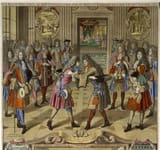Search Results
7/9/2025, 9:39:26 AM
>>509901075
>Louis XIV had allowed James II and his son to remain in France but from 1716 the exiled Stuart Court was based in Papal territory first at Avignon and then finally at Rome. France nonetheless remained a centre of support and home to many Jacobites
>Historians take opposing views of the Jacobites and Jacobite freemasonry. Some argue that it functioned as a fraternal association of exiled Jacobites and a private space for men of a similar social status. Others hold that France and Paris in particular was a well-spring of Stuart conspiracies. Both are probably correct, with Jacobite political views spanning a range from revolutionary to more moderate. And despite many paying lip service to the Stuart cause, only a minority were active insurgents and loyalty to the Stuart cause ebbed and flowed
>In Paris, Jacobite Freemasonry under the exiled Lord Derwentwater gained traction and began to accrue support in court and government circles. Britain’s ambassador to France, Earl Waldegrave, a member of the Duke of Richmond’s Horn Tavern Lodge, warned London that the Jacobites were lobbying Louis XV and his ministers to favour the Stuart cause and that freemasonry had become integral to the process. Regardless, Cardinal Fleury, Louis XV’s chief minister, believed the Jacobites lacked sufficient backing to guarantee a Stuart Restoration and offered only limited support. Indeed, French assistance was modest until Fleury’s death in 1743 when more hawkish officials took his place and helped facilitate the 1745 Rising
>>509856332
>Irish Freemasonry in 18th Century France
>There is great need for further and more accurate research on 18th Century Freemasonry. Nowhere is this need more apparent than for 18th Century France. That is not to say that good research is lacking. It is simply that so much material exists which has not yet been studied
>Louis XIV had allowed James II and his son to remain in France but from 1716 the exiled Stuart Court was based in Papal territory first at Avignon and then finally at Rome. France nonetheless remained a centre of support and home to many Jacobites
>Historians take opposing views of the Jacobites and Jacobite freemasonry. Some argue that it functioned as a fraternal association of exiled Jacobites and a private space for men of a similar social status. Others hold that France and Paris in particular was a well-spring of Stuart conspiracies. Both are probably correct, with Jacobite political views spanning a range from revolutionary to more moderate. And despite many paying lip service to the Stuart cause, only a minority were active insurgents and loyalty to the Stuart cause ebbed and flowed
>In Paris, Jacobite Freemasonry under the exiled Lord Derwentwater gained traction and began to accrue support in court and government circles. Britain’s ambassador to France, Earl Waldegrave, a member of the Duke of Richmond’s Horn Tavern Lodge, warned London that the Jacobites were lobbying Louis XV and his ministers to favour the Stuart cause and that freemasonry had become integral to the process. Regardless, Cardinal Fleury, Louis XV’s chief minister, believed the Jacobites lacked sufficient backing to guarantee a Stuart Restoration and offered only limited support. Indeed, French assistance was modest until Fleury’s death in 1743 when more hawkish officials took his place and helped facilitate the 1745 Rising
>>509856332
>Irish Freemasonry in 18th Century France
>There is great need for further and more accurate research on 18th Century Freemasonry. Nowhere is this need more apparent than for 18th Century France. That is not to say that good research is lacking. It is simply that so much material exists which has not yet been studied
Page 1
